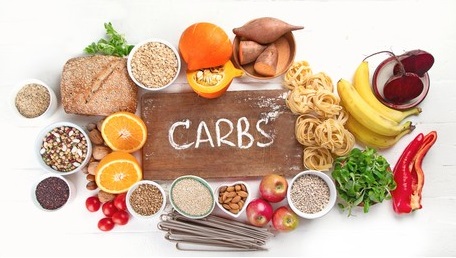Contents
What Are Carbs?
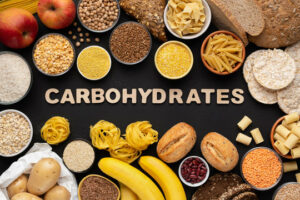
Where do you get energy from? It’s these three types of food, namely, carbs, proteins, and fats that give your body energy. The moment you eat any food that has carbs, or carbohydrates, (or saccharides your body crushes those carbs down into glucose, which is a form of sugar. And then, the blood sugar levels in your body rise immediately.
In contrast, the other two types of food, fats, and proteins do not impact the glucose levels the way carbs do. Their digestion process is slow. However, all of them provide fuel for energy. But carbs are the main source of energy for your body.
Chemistry of Carbs
Carbohydrate is the chemical structure of carbon, hydrogen, and oxygen atoms. The two compounds present in carbs are aldehyde and ketones. Carbs bind to form polymers, or chains to form various types of carbohydrates such as monosaccharides, disaccharides, or polysaccharides.
Types of Carbs
All the carbs are divided into categories based on the number of sugar molecules present in them. Mainly, there are two types of it: Simple and Complex.
Simple Carbs
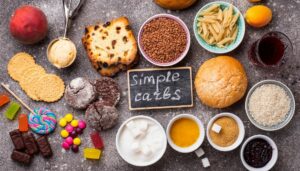
Simple carbs get digested quickly and easily result in a sudden hike in blood sugar levels. As they get digested quickly, you soon start craving for more carbs.
You get a short-term energy hit, but you are soon hungry again. Your energy levels drop, so you eat more carbs. And the whole process starts all over again. Simple carbs are unhealthy.
These have one or two sugar molecules and contain fructose, lactose, sucrose, and glucose. You can find natural simple carbs in :
- Fruits
- Fruit juices
- Milk
- Milk products
Complex Carbs
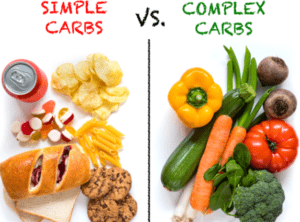
These are carbs that do not get digested quickly because they possess long and complex chains of sugar molecules. They have polysaccharides and oligosaccharides. Complex carbs also have fibre and starch. These provide you with energy for longer periods.
Complex carbs can be found in:
- Whole grain products
- Peas and beans
- Vegetables and fruits
Refined Carbs
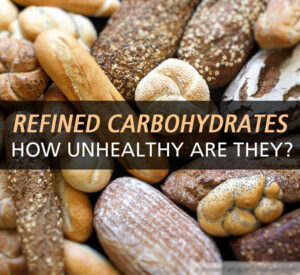
These foods are those that have gone through a long process, under which they lose their high nutritious values, fibre, and minerals.
You find refined carbs in:
- White bread, white pasta, and white rice
- Cakes and baked goods
- Sweeteners and high fructose corn syrup
How Does Your Body Process Carbs?
As you consume carbohydrates, your body tends to break those into glucose. This is done for three of the following reasons:
- To use them as a fast source of energy for bodily functions.
- To help you with a quick and instant source of energy when exercising.
- Reserve them as a stored source of energy in the muscles, or liver and release them when required.
If your body has stored enough glucose (from the broken carbs) and it does not require any more of it, the leftover glucose gets stored as fat. And this leads to weight gain.
How Do Carbs Affect Diabetes?
Diabetes and carbs cannot go hand in hand. If you have diabetes, you have to be very careful with carbs. Though it’s a main source of energy to your body, it affects your blood sugar levels very quickly.
Crabs Effect on Type 1 Diabetes
Since all carbohydrate is converted into glucose, in a normal body the insulin being produced by the pancreas deals with the glucose. The insulin processes the glucose and transfers it to the body cells where it gets absorbed for body fuel to produce energy.
But in Type 1 diabetes, the body doesn’t produce insulin because of which the glucose remains in the blood itself, ultimately raising your blood sugar levels. So, for processing carbs, a diabetic body requires artificial insulin. For insulin, type 1 diabetes patients either follow twice-daily or basal-bolus insulin regimen.
Carbs Effect on Type 2 Diabetes
However, in type 2 diabetes the body produces insulin but the result of glucose remaining in the blood is the same here as well. The reason behind this is that a type 2 diabetic body is not able to use the produced insulin. One of the main causes of type 2 diabetes is being overweight or obese. And carbs play a major role in weight gain. So, patients with type 2 diabetes need to keep a count of the carbs they intake.
Carbs And Glycemic Index
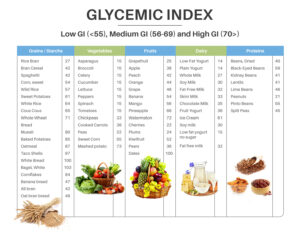
Calm and the glycemic index of food are interrelated. The glycemic index is used to measure how much explicit food sources increase blood sugar levels. If you talk more precisely, the glycemic index offers food and reads the number of cards present in it. carbs and glycemic index are directly proportional to blood sugar level.
But this doesn’t allow a diabetic patient to eat whatever amount of low glycemic food they are willing to.
Why Reduce Carbs?
It’s true that the main source of energy for our body is still you need to reduce the amount of it if you are consuming it in an excessive manner, or in a regulated manner. Most of you follow a sedentary lifestyle these days, And so to maintain an ideal weight or an ideal BMI you need to Limit your intake. experts suggest 130 grams of carbohydrates if enough for adults. or whatever amount of calories you are having in a day, only 45 percent to 60% of that total cal should amount to cards.
Low Carb Diet
A low-carb diet is quite effective and has been proven to reduce body fat most effectively through substituting your body fuel from carbs with other macronutrients.
To achieve this nutritional shedding of carbs it’s important to regulate the fueling and dietary methods of your body in such a way that the excessive fats and proteins that your body consumes put it in a state of utilizing them unilaterally.
Having a low-carb diet has been proven to be extremely effective for type 2 diabetes because of its efficiency to decrease high blood sugar levels, pumping up the body’s insulin sensitivity, and lowering weight. Apart from the health benefits, it has effects on epileptic patients and patients with Alzheimer’s and Parkinson’s disease.
The dietician and doctors have analyzed the carb content in major foods categories such as vegetables, fruits, oils, dairy products, and suggest a prepared list of which foods to eat or not.
Let’s discuss each of these categories in detail.
High Carb Vegetables To Avoid
Let’s look at the starchy vegetables that you should avoid due to their higher carb content :
- Sweet potatoes
- Yams
- White potatoes
- Parsnips
- Green peas
- Corn
- Leeks
Low carb Vegetables
Although vegetables are a healthy alternative on any given day while sticking to a low carb diet it’s necessary for you to limit your daily carbohydrate intake and in order to do that, you must steer clear of all starchy vegetables!
Starchy vegetables might mess with your blood sugar and pour all your hard work down the drain. If any vegetable has more than 5g of carbohydrates per 100gs then it is a starchy vegetable.
Even though it might seem unlikely, a lot of starchy vegetables such as potatoes have high starch or carb content and thus can lead to a spike in your blood sugar levels.
The good news is that there are several non-starchy vegetables with low carb content. So we advise that you prefer these low carb vegetables such as:
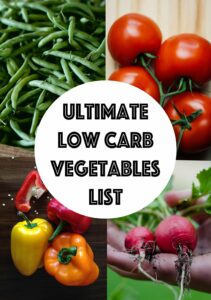
- Romaine lettuce
- Spinach
- Swiss chard
- Bok choy
- Kale
- Celery
- Radishes
- Cucumber
- Asparagus
- Cabbage
- Cauliflower
- Broccoli
- Kohlrabi
- Fennel
- Zucchini
- Peppers (especially green)
- Green beans
- Brussel sprouts
- Green onions
- Tomatoes
Low carb Fruits
Let’s now talk about the second food category: Fruits
While all fruits are delicious it’s important to know their nutritional value. Some of these can spike up your carb intake and can bring your low-carb journey to a halt, so you must avoid these at all costs. Some of these fruits are:
- Bananas
- Mangoes
- Grapes
- Cherries
Even though most fruits contain high amounts of sugar, berries are an exception with a high amount of fiber berries like blackberries, blueberries, and even strawberries and are suitable for a low-carb diet. Moreover so are coconuts, limes, lemons, rhubarb, and blackcurrant. They also are a rich source of antioxidants that prevent inflammation.
List of low carb fruits:
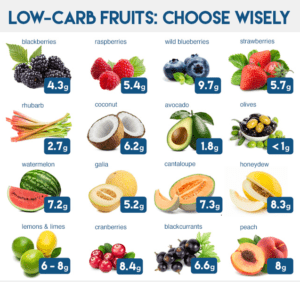
- Blackberries
- Raspberries
- Wild blueberries
- Strawberries
- Rhubarb
- Coconut
- Avocado
- Olives
- Watermelon
- Galia
- Cantaloupe
- Honeydew
- Lemon & Limes
- Cranberries
- Blackcurrants
- Peach
Low carb meat, poultry, and seafood
Meat and poultry have been established as a great source of protein for decades, and have therefore been called a staple for a low-carb diet. Almost all meat, poultry, and seafood are low in carb content, and rich in protein.
Fresh meat is a treasure of vitamin B and other nutrients. Fish and shellfish are low-carb foods. Salmon and other fish are rich in B vitamins, potassium, and selenium, yet virtually carb-free
However, it is best to choose grass-fed meat, because grass-fed animals produce ‘omega-3’, Fats and linoleic acid, and antioxidants, which are lacking in most grain-fed animals.
Salmon and sardines, mackerel, and other fatty fish are very high in omega-3 fats, which have been found to lower insulin levels and increase insulin sensitivity, in people who are overweight and obese.
Low carb Nuts and Seeds
Most nuts and seeds are low in carbohydrates, yet rich in calorie content. They have extensive amounts of fiber, that can make you feel full early. Apart from benefits to diabetes, frequent nut consumption can also lead to decreased risk of cancer, heart diseases, and more chronic illnesses. Here are some of the nuts you can eat while following a low carb diet:
- Almonds
- Macadamia
- Hazelnuts
- Brazil nuts
- Pili nuts
- Pistachio
- Pecan
- Walnuts
- Flax seeds
- Hemp seeds
Diary products Low in Carbs
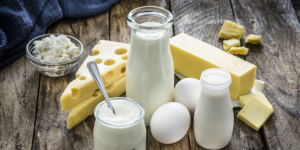
Milk is a staple of many diets. Milk can be an important source of calcium, vitamin D, and protein while contributing to daily fluid intake. But, Milk’s carbohydrate count can impact blood sugar, which might be a concern for people with diabetes.
Grocery stores often offer many types of milk, including cow’s milk, soy, flax, rice milk, and almond milk. We suggest that you take Soy, flax, and almond milk owing to the lower carb content compared to cow’s milk and other milk types.
Another good news is that most other milk products are low carb and good for diabetes.
For example, there are hundreds of types of cheese and all of them are low in carbs. Cheese also contains Conjugated Linoleic acid which is fat that has been linked to fat loss as well as helps in improved body composition. You can try any type of cheese including cheddar, cottage cheese, cream cheese, and mozzarella.
Other dairy products such as curd and whipped cream can also be included freely in your diet.
Low carb Oils
 We have been taught to fear fats and oils all our life. But fear no more. This low-carb diet is a fat-friendly diet. What’s more interesting is that fats keep you full for longer, so you might stop feeling hungry between meals while your body is using it as its primary fuel.
We have been taught to fear fats and oils all our life. But fear no more. This low-carb diet is a fat-friendly diet. What’s more interesting is that fats keep you full for longer, so you might stop feeling hungry between meals while your body is using it as its primary fuel.
The main source of fats is usually the cooking oils we use. With a little bit of discretion and knowledge of the low-carb diet, not all fats are useful.
You should cook your food with SFAs (saturated fats) such as Avocado oil, coconut oil, lard/tallow, ghee, and palm oil. Use Monounsaturated such as Macadamia oil, and olive oil for dressing & sauces, in smaller quantities.
However, it is best to steer clear of refined fats with unbalanced omega ratios like Corn oil, Sunflower oil, peanut oil, Canola oil, corn oil, soybean oil, and grapeseed oil.
It becomes clear with every trial that a low-carb diet plan works really well for patients with type 2 diabetes and those who are prediabetic because they tend to be overweight or obese.
To summarize, here are some of the common food items that could be a part of a low-carb diet.
- Non-starchy veggies
- Low carb fruit
- Fish, Poultry, and Meat
- Most Nuts and seeds
- Milk products such as Flax milk and cheese
- Saturated oils such as Avocado oil, coconut oil, lard/tallow, ghee, and palm oil
Here are some foods to limit or avoid in a low-carb diet plan:
- Grains (including wheat and rice)
- Fruit (especially high-carb fruit such as Mango)
- Sugar in all forms (granulated sugar, brown sugar, corn syrup, baked goods, candy
- Artificial sweeteners
- Processed food (including crackers, and corn or potato chips).
A Word From MantraCare
If you are facing diabetes-related issues, MantraCare is here to help. Book your free trial online diabetes consultation session now to connect with a specialist diabetologist.
